Free markets are thriving in Freetown and throughout Sierra Leone. You see the competition all around you.
Except the capital is war and poverty. The clients are expats. And the merchants are anyone with a story of suffering and hardship to tell. And the product is horror.
All along the streets and beaches, Sierra Leoneans compete with each other over finding and often contriving the right story to tell of war, poverty, and loss. Sometimes the pitch is simply nudging you with the remaining stumps on their arms (or “residuals” as prosthetic limb designers call them) or asking for money to watch the African cup. Some are prepared with letters and documents of their hardship and needs. Some just follow you for miles on the beaches, requesting aid as your new found Padi (Friend) or Brother. Some tell of their families being killed in the war; some tell of their hungry children at home; some simply tap on the window as your car drives by; some stick their deformed arms in your face or grab your hand pleading for money and food to eat.
It’s a skill, honed by years of sales to expats, discerning what the NGO or UN agency or individual needs to hear to open up the pocketbook and dole out some money. It’s a talent finding the right pitch to reach into the deep pockets of white man, sympathetic and naïve. And so hardships and difficulties are invented, and Sierra Leoneans become fierce advocates for their own impotence so the white man can come and rescue them.
But the pitch becomes so good, comes so often, it becomes harder to discern truth from lie, genuine hardship from contrived. But then, in a country like Sierra Leone, with a life expectancy around 40, with 75% of the population under $2 a day, with over a quarter of the children dying before the age of 5, what hardship isn’t genuine here?
George Packer wrote of war amputees who were brought to Long Island, New York, to be fitted with expensive prosthetic limbs and then returned to their homes in Sierra Leone. He discovered that many of the prosthetic limbs were left gathering dust in some corner of their shack or tin hut. It was so much harder to get sympathy with a nice prosthetic limb on your residual… victimhood was so much easier without a visible sign of the aid you’ve already received.
Maybe this isn’t the capitalism, the free market Adam Smith had in mind. Maybe this is an example where individual self-interest is counter-productive, causing people – like me, with deep pockets and sympathy – to no longer know who to believe and then turn away by default, even from the genuinely needy and genuinely honest. Maybe this is part of the irrationality of man, Kahneman’s psychology of decision-making, injecting itself into the rational calculation of economics. Maybe this is a downside Smith or Milton didn’t consider… Milton, the economist, but I suppose John Milton pertains as well.
For truly, a country sitting on billions in diamonds, with rutile, bauxite, petroleum and now even uranium; a country with arable land and vast fisheries; a country with miles of stretching beaches for the European tourist; a country with all that relying on free market victimhood and horror, isn’t that truly a paradise lost?
Wednesday, March 19, 2008
Subscribe to:
Post Comments (Atom)

No comments:
Post a Comment